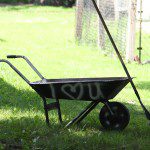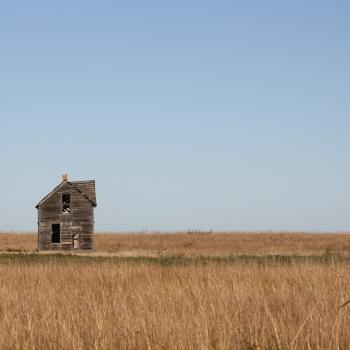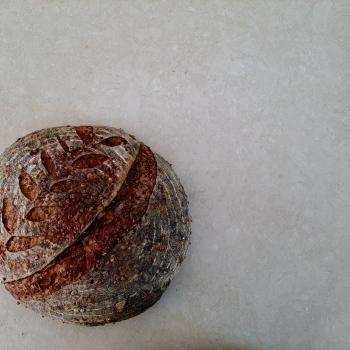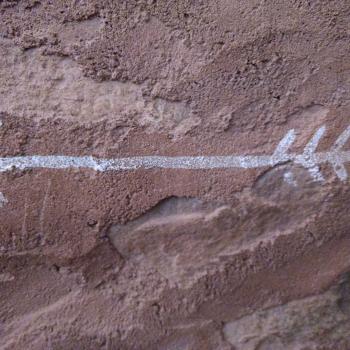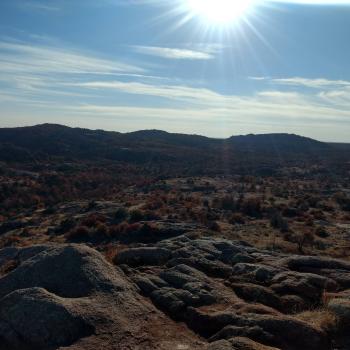
Lord, give me this water. (John 4:15)
Two weeks ago, we had a little water problem in our rural Kansas community. Chalk it up to a water main break under the nursing home and a system-wide pressure drop. The end result was standing water in the nursing home, elderly whisked to dryer quarters in the dead of night, and our whole community coming under a boil order. It all seems very dramatic when it’s flashed across the TV screen, but families and other local nursing homes stepped up to provide shelter for the displaced elderly, and most people appeared to take the boil order in stride. The Lions Club handed out bottled water downtown. Our family reminisced about our time in Cuzco, Peru, where we always had to boil our drinking water. We survived Boil Order 2017.
But it makes you think: what are we drinking? Residents of Flint, Michigan famously had to deal with lead poisoning their water. Many rural communities deal with the less publicized, but still dangerous and persistent, problem of fertilizer runoff percolating down into their water supply. For instance, the Center for Rural Affairs reports that some twelve percent of private wells in Iowa had nitrate and bacteria contamination levels over the legal limit. The risk of drinking water pollution is one of the quiet dangers of rural life, a danger often overlooked by our propensity to imagine the countryside as a bucolic heartland. Waking up to a boil order reminds us how many assumptions we make turning on the tap, and just how fragile the whole system is.
What are we drinking? It’s a question that goes beyond the purity of our water supply. Jesus got a Samaritan woman to think about what she was drinking with the simple act of asking for a drink (John 4:7). The woman at the well had drunk in her culture’s assumptions and prejudices unthinkingly. She knew the role that Samaritans must play toward Jews, could rehearse the old debates about which mountain God preferred (John 4:20), but couldn’t recognize the “gift of God” staring her in the face (John 4:10). She missed the ancient newness of Jesus.
Us too. In our blithely present-centric moment, we drink in our culture’s glittering assumptions but are evermore estranged from the deep well of Christian faith. All too often, we’re drinking from poisoned wells. We’re gulping down movies and television and books and comics–not to mention conspiracy theories and alternative facts–that slip a set of values into our lives that is foreign to the gospel. It may just be that I’m getting crotchety in my middle age, but I’m struck by how little of what passes for entertainment in our society meets Paul’s threshold for what is true, honorable, just, pure, commendable, excellent and worthy of praise (Philippians 4:8).
The woman at the well at least had one thing going for her: she was thirsty for something better. When Jesus engages her in a kind of rabbinical back and forth the woman says, “Sir, give me this water, so that I may never be thirsty or have to keep coming here to draw water” (John 4:15). It’s a simple statement on the surface of things, but John points us toward a deeper meaning. The woman isn’t just asking for a labor-saving means to get her daily water. She’s praying. The “sir” of our English translations is in fact Kyrie in Greek. While it can mean simply “sir” (like in John 12:21), in the biblical context it sometimes carries with it the weight of God’s name: Lord. That takes things a tad deeper. “Lord,” prays the woman, “give me this water.”
We may be lost, very lost, drinking from all the wrong wells, but if we at least recognize that we’re thirsty for something better, then there may yet be hope. We won’t know what we’re looking for at first. The contaminants in the well are mostly invisible. But we can pray for the living water, pray for a thirst for the right things, pray for the presence of Jesus himself. We can claim the Samaritan woman’s accidental prayer for our own: Lord, give me this water. That’s a good start: a prayer for thirsty people who long to drink something better.

